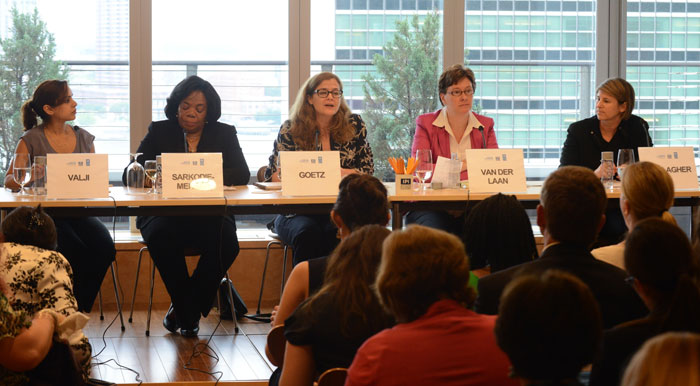
When a 13-year-old Sierra Leonean girl was raped by the chief of her tribe, her parents forced her to marry him so as to avoid shame and stigma for the family. This would have been the accepted solution, had it not been for Sierra Leone’s new law that prohibits marriage for people under the age of 18. Eventually, the perpetrator was convicted and the marriage was annulled.
This was one of several stories that emerged from a May 27th IPI policy forum highlighting the troubling reality of women and children being subject to sexual- and gender-based violence (SGBV) not only before and during conflicts, but also after ceasefires have been agreed to. Entitled “Combating SGBV in Postconflict and Crisis Contexts,” and organized jointly by IPI, UN Women, and the United Nations Development Programme (UNDP), the forum brought together a group of practitioners with on-the-ground experience assisting in post-conflict reconstruction.
“For human rights and recovery reasons, it is critical that both during and after conflict the issue of justice for women is addressed as a priority of the UN system,” said Anne Marie Goetz, Clinical Professor at the Center for Global Affairs at New York University. The panelists said that the UN has achieved a great deal over the past few years in its effort to address violence against women by recognizing that post-conflict sexual violence is a real problem.
But there is more the UN could do, the speakers said.
“We need to mainstream the combat of sexual violence in every element of peacebuilding,” said Corina van der Laan, the Head of the Stabilization and Rule of Law Division in the Department for Stabilization and Humanitarian Aid at the Dutch Ministry of Foreign Affairs. This can be done by addressing sexual violence by training peacekeepers in countering violence, she said, or by acknowledging the problem during peace negotiations.
“Peace negotiations are all about stopping the shooting, but not about terminating sexual violence,” Ms. van der Laan said. “So if women continue to be raped, that’s technically not a violation of the ceasefire.”
Despite the recent momentum at the international level, women still face structural challenges when it comes to seeking justice after sexual-based crimes. A key obstacle is the widespread gender inequality that characterizes many societies, particularly those plagued by violent conflict.
“If we are not addressing the gender inequalities that render women vulnerable to these kinds of violations, reparations will never have the impact that we’re seeking,” said Nahla Valji, Programme Specialist in the Rule of Law and Transitional Justice division at UN Women.
Ms. Valji also noted that the breakdown of judicial systems, coupled with a widespread culture of impunity, are two additional factors that speak to the deep structural problems the UN will inevitably have to face if it truly wishes to put an end to sexual violence.
So far, the UN system, and the UNDP in particular, has sought to pool efforts, she said, “to ensure that we have the targeted technical capacity with regard to investigations of sexual violence crimes.”
At the same time, some countries have begun to take their own steps. Madame Julia Sarkodie-Mensah, Master and Registrar of the Sierra Leone Judiciary, said that in Sierra Leone, almost all families have experienced sexual violence in some form or another.
“But the end of impunity is coming,” she predicted. “Although traditional values make it very difficult for women to speak out, in Sierra Leone, forced marriage is now considered a crime against humanity,” and the country is a signatory to several international treaties and conventions, she said.
Ultimately, regardless of the means employed, protecting women and children from sexual- and gender-based violence in crisis situations needs real global commitment. “We [as the international community] owe them the dignity that they should have as human beings,” said Jordan Ryan, Assistant Administrator and Director at the UNDP.
Women and children like the 13-year-old Sierra Leonean girl who was forced to marry the man who raped her “have had the most awful existence thrown at them,” Mr. Ryan said. But, he added, “they are some of the strongest people that exist in our world.”
Ms. Goetze moderated the discussion, and IPI Director of Events Mary Anne Feeney delivered welcoming remarks.
Watch event:







